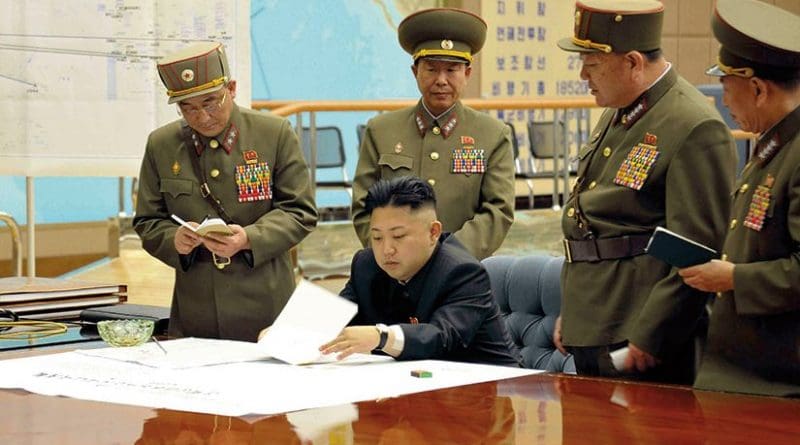How Kim Transformed From Warmonger To Peacemaker – OpEd
By Arab News
By Zaid M. Belbagi*
The hardline stance pursued by the United States in respect of the North Korean weapons program has essentially forced Pyongyang into a corner. Faced with choosing between regime survival and nuclear weapons, it seems they have decided upon the former. With the threat of US military action growing, Kim Jong Un appears to have taken the decision to recalibrate his regime with a focus on economic development, as opposed to asserting his country’s international pariah status as his sole source of legitimacy. As the smallest and poorest country in Northeast Asia, how the regime navigates the expected detente whilst also remaining in place will be the key concern of its leadership.
The Juche ideology is central to North Korea’s highly centralized one-party state. An important part of this is the cult of personality around the regime’s founder, Kim Il Sung, his conflict with pro-Soviet and pro-Chinese dissenters, and Korea’s centuries-long struggle for independence. In many respects, the nuclear weapons program it has pursued has been an expression of these principles, allowing the embattled regime to reinforce its identity as a plucky adversary in the complex East Asian security environment, and a force to be reckoned with in the eyes of the international community.
Recent history has no doubt informed the decisions of North Korea’s leader. Libya and Iraq previously upped their WMD programs, only to fall prey to foreign intervention and regime change. In an effort to safeguard against such action, North Korea has sought a credible nuclear deterrent as an insurance policy for its antiquated regime. The similarities must be all too clear for Kim. Muammar Gaddafi was the head of a socialist dictatorship built on a cult of personality. Under his leadership, Libya earned a reputation as a rogue nation breaching international norms and proliferating weapons of mass destruction. Gaddafi’s 2003 decision to give up his weapons program and allow in international inspectors did not lead to a successful reintegration of his country into the international community. Rather, it led to a NATO military intervention to support rebels in overthrowing his regime. Only now that North Korea has developed weapons with the capability to threaten the US, though unreliably, has Kim been able to enact a seemingly overnight transformation from warmonger to peacemaker.
International sanctions and diplomatic pressure have played a role in bringing Kim to the table. Sanctions continue to strangle North Korea’s oil and fuel supplies, causing unrest amongst high-ranking citizens to grow. Only last year, several senior members of the leader’s inner circle vanished, including Gen. Hwang Pyong So, who had served as the head of the politburo until he was removed in October. With dissent growing and a newly entrepreneurial class of North Koreans hooked on financial aggrandizement, Kim is under pressure to ensure the economy doesn’t entirely collapse, causing large-scale dissent at home. When Kim announced “byungjin” (parallel development), his policy of pursuing both nuclear missiles and economic development simultaneously, he set himself up to be able to deliver economic opportunities for his allies and alleviate the chronic state of the country’s finances. The prospect of international trade and lucrative partnerships with the first-world South Korean economy may be just enough for Kim to provide the promise of development to his beleaguered people.
The regime’s uneasy but essential over-reliance on China has also informed its perceived commitment to peace. Korean mistrust of China is couched in the experience of millennia and the North is too attached to its ideology of independence to risk becoming a province of Southern China. The experience of recent years has allowed China to maneuver itself to be the regime’s only lifeline. Pyongyang has long needed to diversify its international relationships, and committing itself to a more peaceful peninsula will allow it to chart a new course for the regime’s diplomats. The unilateral relationship with China has given Beijing a complete hold over fuel and basic goods to North Korea — a situation that is of great concern to Pyongyang. Kim is under no illusions that his own uncle was executed for his close relationships with China and that his half-brother, assassinated in Malaysia last year, was reportedly being groomed in the event of Chinese-inspired regime change.
It remains to be seen how Kim intends to retain control of society in the event of an economic and social opening-up, which would transform the country. Rapid economic development may indeed be able to supplant the US bogeyman as the source of the regime’s stability, though there will be serious challenges along the way. The lifting of international sanctions will allow the regime to seek partners other than China. It is likely that, under such circumstances, Beijing will actively seek to contain the ambitious Kim so as to retain its overlordship of its small neighbor. Kim does, however, have a solution in China: Should he be able to replicate its model of authoritarian rule, coupled with economic development, he may be able to secure long-term regime survival.
- Zaid M. Belbagi is a political commentator, and an adviser to private clients between London and the Gulf Cooperation Council (GCC). Twitter: @Moulay_Zaid

